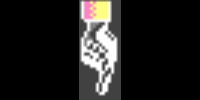


I felt secure and warm and cheerfull surrounded by my Slovenian friends who knew the mountain and were always ready for jokes about broken legs and freezing to death in some of the yet unseen depths under the cliffs of the mountain. Gido was worried about my Yugoslav Army boots - they might not take the long walk through the deep snow that we had to expect later. I should have got Timberland then. There was no snow yet, since the forest was so thick. Later we would walk up the glacier. The ridge of the mountain is the border between Slovenia/Yugoslavia and Austria. Pass the ridge, and walk another 10-15 miles, and you are in the free world, drinking Nescaffe in some local Austrian "berghoff". That was the goal of that trip. At least for me. To get out. So, of course, I wasn't cold at all. I was high on adrenalin as a twentyfour old might be. I was getting out. And it was well planned, just as I always liked.
I traveled by train from Zagreb to Velenje, where I met Gido. From there we took a car to Slovenian countryside, namely to a place known as Robanov Kot (kind of like Roban's Farm). Apparently, freezing, remote and unfriendly parts of Slovenian Alps humiliated Communist's zest for collectivization into allowing private farmers own generous chunks of forested land, that even beared their family names. Robans, a family with six sons which median age equalled mine, for their part were extremely friendly and hospitable (the prejudice in Yugoslavia had that Slovenes, particularly those nuts up the mountains, would shoot anything that moves before saying "howdy").
When we arrived we helped Robans around construction work at some house they were building down in the valley. It was a roof tiling day. I remember pushing a cart loaded with tiles up the hill. I also remember having turned over two or three carts breaking quite a few tiles. I was such a kook. Later they took us up to their home in the dark Slovenian evergreen forest. Their mom made a dinner for twelve or so, obviously used on preparing large quantities of food, and sit us all around the large round oak table. It felt like being in a time-warp. Later, while I was resting with two Roban brothers on the wooden rack atop the huge clay stove that occupied the center of the room, Gido explained Roban parents my story. They nodded silently. They didn't like what was going on in Yugoslavia in 1988, all that loud demonstrations in Serbia and the way how Slovenes were suddenly treated as enemies. They thought that everything went wrong since Tito died. They liked Tito.
Mother Roban then pulled out a family photo album and asked me to climb off the rack: here he was, Josip Broz Tito hunting in Robanov Kot and having dinner with the family, he and some of his cronies (like Stane Dolanc) all in the pictures with young Roban family and their kids playing around, somewhere in seventies. Things have changed.
Since what we were doing was a sort of a covert operation, we thought it'd be better to do it under the cover of night. It was not exactly my intention to really leave the country at that point - but I did want to check the possibility, and I did want to take a picture on the other side of the border, with the border stone in the background. Two hours after the dinner we left Roban's home and prepared for the hike. Hiking in Alps around midnight in the middle of winter is not for tourists. Actually we did not meet a single soul during our hike. After four hours we arrived at the open mountain house (that was common in Alps - so hikers can rest during long hikes) which was already in the restricted border zone. Fifty yards norther the glacier started. At the gorge on the top of the glacier there was a Yugoslav border guard post - manned during the summer months, but empty and closed in winter, and Austria was just behind it. There was a debate should we climb there now or in the morning: we couldn't possibly take a good picture without substantial lighting equipment which was not at hand at that time, so we decided to cath some sleep.
Minutes later some folks started knocking on our doors. At 2 am in January on the top of Savinjsko Sedlo? Quite unlikely. There were three soldiers, a border patrol: two "Bosnians" (Slovenes referred to all non-Slovenes as Bosnians) and one Slovene, who was also a unit commander. The Slovenian did the talking: they searched for two deserters, no less, one Slovenian from Celje and one Croat from Zagreb. Their physical description painfully resembled Gido and me. However, they insisted that the guy from Zagreb (me) wore glasses. Fortunately, I switched to contact lenses just a year before that happened. They asked us for IDs, and we said that we left them in our cars at the bottom of the mountain. The worst part was when the Slovene soldier carried out a casual conversation with each one of us, trying to find out what are we doing here. Gido tried to steer his attention away from me, since my Slovene sucked, and one wrong accent could be fatal. Miraculously, I spoke like I was born "fant" (Slovenian for guy), and they left.
But the next morning - since the army obviously did not find what they were looking for (I mean we were still there) - army helicopters incessantly flew over the area monitoring the glacier: they could not see us while we were in the forest, but we had to climb up that glacier if we wanted to get to the border post (other options would require rock climbing equipment, which we didn't have on us). Gido was a free climber, yet free climbing in January with an army helicopter on your ass escaped hid definition of fun. We settled for a picture with the mountain house (which was also in the restricted border area, where, theoretically, a person whose right to travel has been revoked should not been found), and then headed down the mountain.
Later we learned that Roban's were interrogated by civilian police, and that they were eager to kick my ass, just for a good measure as to make me remember to keep my big mouth shut if I plan secret operations in the future (particularly if those were to involve them). I met Gido since - he forgave me, but he didn't forget - whenever he saw me he brought it up, preferrably in front of the large crowd, so that everybody can burst laughing to me.
 |  |  |